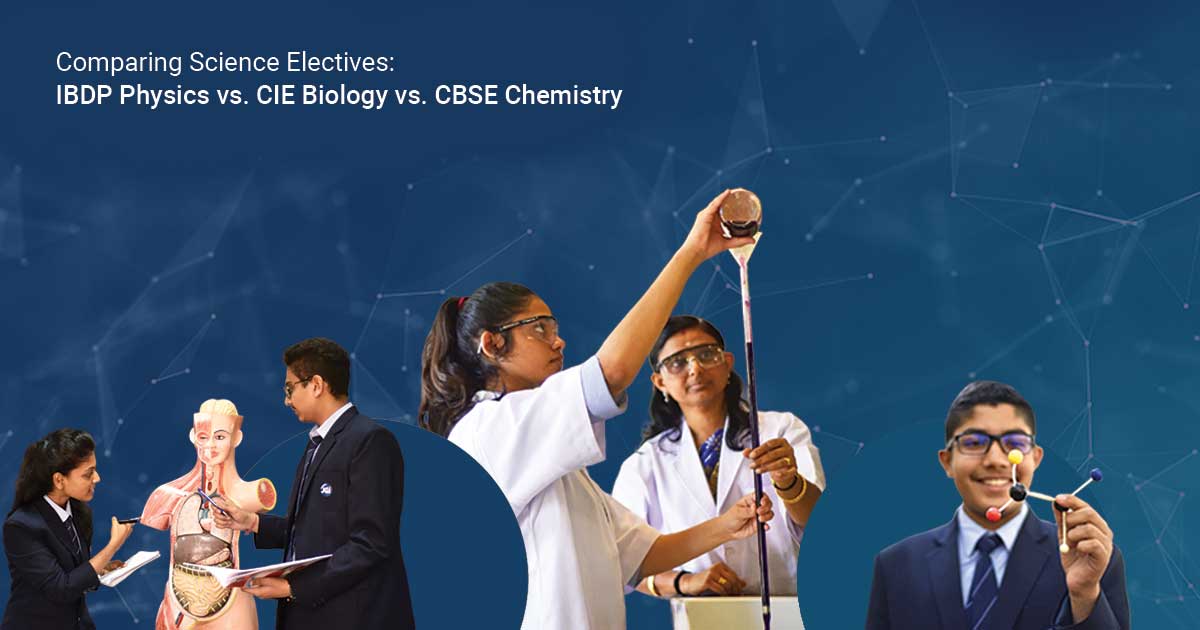

CIE and IBDP are international education boards whereas CBSE curriculum is an Indian board, and all three education boards have an individual approach towards curriculum design and pedagogy. CIE and IBDP aim to create an international perspective to help students become “global citizens”. To that end, the courses in IBDP are interdisciplinary, CIE has a broader curriculum, and the emphasis on both boards is on cultivating communication and interpersonal skills. So, science subjects are more application-based than theory-based. CBSE emphasises strongly on building students’ objective reasoning with an emphasis on Science and Mathematics, thus, theoretical knowledge has higher weightage.
Course Syllabus and Curriculum: IBDP Physics vs. CIE Biology vs. CBSE Chemistry
IBDP gives the alternative to pursue High Level (HL) or Standard Level (SL) Physics.
The IBDP Physics curriculum covers -
Further, students have elective options between -
If you do not have Physics as a core subject in college or if you feel Physics is not a strong subject for you, you can take SL Physics.
The Cambridge CIE science curriculum teaches the fundamentals of Science focusing on Physics, Chemistry and Biology. In Biology, students learn about concepts like -
At the PU level, students learn these topics in greater depth to strengthen their fundamentals and prepare them for various career streams. The CIE Biology is highly technical and students will have to learn a lot of scientific vocabulary. The syllabus is also very extensive, so you have to focus on being prepared with the key Biology concepts, which involves memorising complex terminologies.
The CBSE Chemistry syllabus broadly covers organic and inorganic chemistry, where they will study –
There will be a practical exam where students will be tested on topics like -
There will also be a project for which the topics are specified each year and students can make a choice on the topic they want to research.
IBDP Physics vs. CIE Biology vs. CBSE Chemistry – which will help in selecting a university programme?
Generally, students opt for IBDP or CIE curriculum when they plan to study at an international university after the 2nd PUC. However, At the University level, a greater weightage is given to the student’s SAT, and TOEFL/ IELTS scores with specified cut-off scores in pre-university exams. So, even if you have appeared for your 2nd PU exams from the CBSE board, you still have a good chance of getting the course and the university of your choice.
If you want to pursue graduation in a pure science subject, such as a BSc. programme, then based on the subject and course requirement, you must choose what subject you will study. For the Medical stream, Chemistry and Biology are integral to the programme. With the Engineering stream, Physics is a basic requirement irrespective of which course you pursue. IBDP programme gives you the option to select SL or HL levels so that the students can take any of the subjects at an SL level just to fulfil the requirement.
Interdisciplinary courses
In future, if you plan to pursue an interdisciplinary course, or your career aspirations require you to know any subject, then the 12th PUC level qualifications are often relevant. If mid-way through your graduate programme you want to change the stream, then your 12th subjects can help you fulfil the eligibility criteria. The conversation should be about which board would be suitable to your learning style and career as much as it is about which elective will be suitable. All three boards have their strength, and require the student to be completely dedicated to the course for the duration of the programme.
If you are planning to pursue a career in the sciences, Physics and Chemistry are very important. You can choose to pursue Biology or drop it depending on whether you will pursue a course to which it is relevant.
Recent Blogs
IGCSE Full Form
What is the International Baccalaureate?
IBDP Full Form
CIE Board Full Form
CBSE Full Form
Site Designed and Maintained By : Office of Communications, JAIN Group All rights reserved.